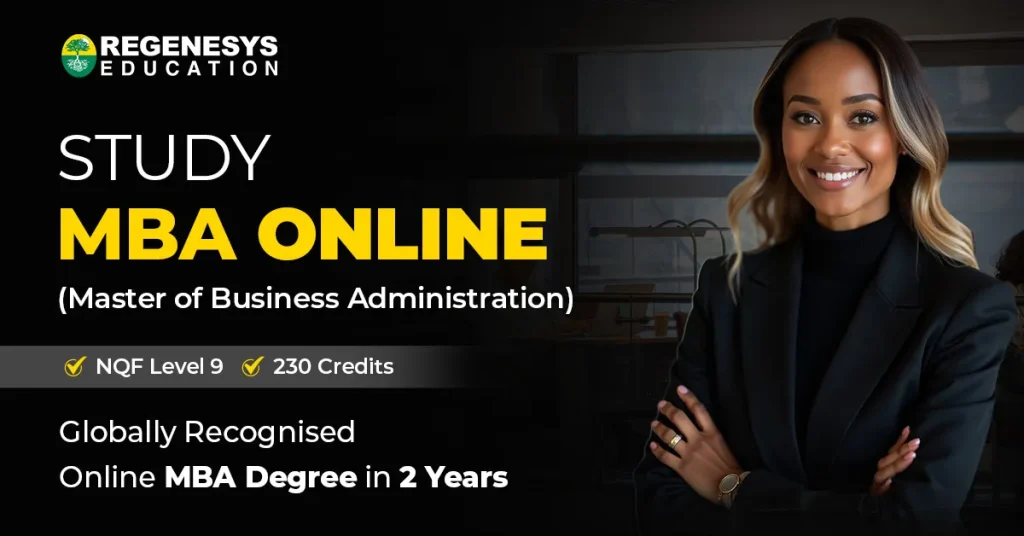The demand for MBA qualifications is growing as more professionals see their value in building leadership and business skills. Globally, MBA programmes are evolving to meet the changing needs of students and industries, offering flexible and innovative approaches to learning. However, in South Africa, an MBA is becoming important because it helps address the country’s unique challenges while opening doors to exciting opportunities in the job market.
In this article, we will look at the MBA future in South Africa, exploring key trends, career opportunities, and how these programmes prepare graduates for success.
Table of Contents
- The Importance of an MBA in South Africa
- Current Trends in MBA Education in South Africa
- Future Prospects for MBA Graduates in South Africa
- Challenges and Opportunities for MBA Holders
- Why Pursue an MBA in South Africa?
- How does Regenesys Prepare MBA graduates for the future?
- Conclusion
- FAQs: The MBA Future in South Africa: Key Trends and Career Opportunities
The Importance of an MBA in South Africa
In South Africa, earning a Master of Business Administration (MBA) is highly valuable. The country’s growing industries, diverse economy, and unique challenges make it an ideal place to pursue this qualification. An MBA equips professionals with the skills to handle complex business environments, drive growth, and advance in their careers. So, while exploring the MBA future, let us explore why an MBA is important in South Africa:
- Higher Earning Potential: Graduates with an MBA often earn higher salaries because employers value the advanced skills and knowledge this qualification provides. It’s a smart investment for your future career.
- Specialised Skills: MBA programmes let you focus on areas like marketing, entrepreneurship, or technology. This allows you to gain expertise that aligns with your career goals and keeps you relevant in today’s fast-changing job market.
- Entrepreneurial Skills: An MBA for future entrepreneurs offers tools like business planning, financial management, and strategy. It also connects you with mentors and investors who can help you succeed.
- Networking Opportunities: MBA programmes are a great way to meet and connect with professionals, industry leaders, and alumni. These connections can lead to mentorship, partnerships, and career opportunities.
Also, understand Advantages of an MBA Degree in South Africa

Current Trends in MBA Education in South Africa
MBA education in South Africa is adapting to meet the needs of a fast-changing world. With new technologies, economic changes, and a focus on sustainable business practices, these programmes are evolving to prepare students for leadership roles in today’s business environment. Here are some current trends shaping the MBA future education in South Africa:
- Flexible and Customised Learning: MBA programmes now offer online and hybrid options, making it easier for working professionals to study without leaving their jobs. These programmes also allow students to choose courses that match their career goals, creating a more personalised and engaging experience.
- Experiential Learning Opportunities: Practical experiences, such as internships, real-world projects, and simulations, are now an essential part of MBA programmes. These activities help students apply what they learn in the classroom to real-world challenges, making them better prepared for the workplace.
- Sustainability and Social Responsibility: Business schools are teaching students about sustainable business practices. Courses on corporate social responsibility (CSR) and sustainability prepare graduates to tackle issues like climate change and social equity, reflecting the growing importance of ethical business strategies.
- Global Perspectives and Networking: South African MBA programmes are connecting students to the global business world. Partnerships with international institutions and diverse faculty bring new insights, while networking opportunities help students build relationships that extend beyond South Africa.
- Leadership and Critical Thinking Development: Modern MBA programmes focus on building leadership and problem-solving skills. These programmes teach students how to think critically, make ethical decisions, and adapt to the rapidly changing business environment of the Fourth Industrial Revolution (4IR).
Find out more about Job Security and the Fourth Industrial Revolution
Future Prospects for MBA Graduates in South Africa
An MBA opens up many opportunities in South Africa. It equips MBA future graduates with leadership, business, and problem-solving skills, making them ready for success in various industries. Here are some key future prospects for MBA graduates in South Africa:
Career Growth
An MBA often leads to leadership positions like CEOs, CFOs, and strategic consultants. These roles require the advanced skills and knowledge that MBA graduates bring. South Africa’s diverse economy offers career options in industries such as finance, healthcare, technology, and public sector management, creating a promising MBA future for graduates across various sectors.
Entrepreneurial Opportunities
For aspiring entrepreneurs, an MBA provides essential tools to start and grow a business. Graduates learn how to plan, manage finances, and think strategically. MBA programmes also connect students with mentors, investors, and potential business partners, laying a solid foundation for entrepreneurial success. With the right guidance, the MBA future for entrepreneurs in South Africa’s dynamic economy looks bright.

Global Opportunities
With its global recognition, an MBA allows graduates to pursue careers internationally. Graduates gain insights into global business trends while understanding South Africa’s unique economic environment. This combination makes them valuable for roles in international markets and companies, ensuring that the MBA future remains strong on a global scale.
Impact on Public and Social Sectors
MBA graduates can make a difference in public and social sectors by working in government, NGOs, or community projects. Their skills in leadership and strategy help tackle challenges like unemployment and inequality. Hence, as they take on leadership roles, the MBA future in these sectors allows graduates to drive positive change and contribute to South Africa’s development.
Explore the Future of MBA Education: Emerging Trends
Challenges and Opportunities for MBA Holders
MBA graduates face a variety of challenges as they enter the workforce and advance in their careers. However, these challenges also come with unique opportunities for growth, leadership, and impact in diverse industries.
So, while you explore the MBA future in South Africa, you must know the key challenges and opportunities MBA holders may possess:
Challenges:
Here are some of the challenges faced by MBA holders in today’s competitive business environment:
- The job market is highly competitive, with many candidates applying for the same roles, making it tough to secure the ideal job.
- Adapting to new company cultures and expectations can be difficult, especially when switching industries or organisations.
- MBA graduates must update their skills to stay relevant in a tech-driven business world.
- Maintaining a healthy work-life balance is challenging due to long working hours and high-pressure roles.
- Leadership roles require managing teams, making decisions, and resolving conflicts, demanding strong communication and emotional intelligence.
- Economic changes and market instability can create challenges in making the right decisions during uncertain times.
Opportunities:
The following are key opportunities available to MBA graduates, highlighting the potential for growth and success in various sectors:
- An MBA opens up a wide range of career options across various industries, allowing graduates to follow their passions.
- MBA programmes provide valuable networking opportunities to connect with professionals, mentors, and potential employers.
- Graduates acquire crucial leadership, strategy, and problem-solving skills, making them highly desirable to employers.
- MBA graduates can use their education to start their own businesses or ventures, exploring entrepreneurial opportunities.
- An MBA offers the chance to work internationally or with global companies, expanding career options.
- Graduates can lead initiatives promoting sustainability and corporate social responsibility (CSR), making a positive impact.
- Adaptability to new trends and challenges enables MBA graduates to grow in their careers continuously.
Also, read our article on MBA In South Africa: Opportunities, Challenges And Impact
Why Pursue an MBA in South Africa?
Pursuing an MBA in South Africa offers a unique opportunity to gain valuable business knowledge and skills in a dynamic and diverse environment. So, as you understand the MBA future in South Africa, you should know the reasons that highlight why pursuing an MBA in South Africa is important.
Below are some key reasons to consider studying for an MBA in South Africa:
- Access To Top-Tier Institutions: South Africa is home to renowned institutions such as Regenesys Business School, offering world-class MBA programmes and a strong network of alumni.
- Exposure To African Business Dynamics: Students gain practical insight into Africa’s unique economic challenges and opportunities, preparing them for the diverse African market.
- Focus On Innovation And Sustainability: MBA programmes in South Africa emphasise entrepreneurship, innovation, and sustainable business practices, ensuring graduates are equipped for future business challenges.
How does Regenesys Prepare MBA graduates for the future?
Regenesys Business School ensures MBA graduates are ready for the future by providing a practical and forward-thinking education. With a focus on real-world skills and a strong professional network, Regenesys prepares its students for success in a fast-changing business world. Here’s how:
- The curriculum blends global trends with local business needs, preparing students for international and local markets.
- Students gain practical experience through projects and case studies, helping them apply their learning in real-world situations.
- Regenesys offers a strong alumni network and industry leaders, providing mentorship and career opportunities.
- Flexible study options allow working professionals to manage their studies alongside their careers.
Also, read our article on Discover the Advantages of Regenesys Business School’s MBA

Conclusion
Pursuing an MBA in South Africa is a valuable investment for anyone looking to advance their career and gain valuable business skills. As the demand for MBA future graduates grows, these qualifications help professionals develop leadership and problem-solving abilities. In South Africa, MBA students get a unique setting, offering insight into the country’s specific business challenges and opportunities. These programmes emphasise innovation, entrepreneurship, and sustainability, ensuring graduates are prepared for the future of business. Hence, with the right skills and knowledge, graduates can significantly impact industries, shaping the future of business in South Africa and beyond.
Gain the skills, knowledge, and network to excel in leadership roles with Regenesys’s Master of Business Administration (MBA) programme. Enrol now!
FAQs: The MBA Future in South Africa: Key Trends and Career Opportunities
Why is an MBA important for the future of South Africa?
An MBA is important in South Africa because it equips professionals with the necessary skills to address the country’s unique business challenges. It enhances leadership and decision-making skills, preparing graduates for success in a dynamic job market and future business opportunities.
What are the key trends shaping the MBA future in South Africa?
Key trends shaping the MBA future in South Africa include flexible and customised learning options, experiential learning opportunities, and leadership development. These trends ensure that MBA graduates are prepared for evolving business environments.
How does an MBA prepare graduates for future career opportunities?
An MBA of the future provides graduates with broad skills, including leadership, strategic thinking, and entrepreneurship. These skills make them eligible for senior management roles and entrepreneurial ventures, opening doors to various career opportunities in South Africa and internationally.
How does pursuing an MBA in South Africa benefit my career prospects?
Pursuing an MBA in South Africa offers exposure to Africa’s unique economic dynamics and provides access to a strong network of professionals. This makes it an ideal qualification to advance your career and build a successful future.
What are the career prospects for MBA graduates in South Africa?
MBA graduates in South Africa can explore leadership positions such as CEOs, CFOs, consultants, and entrepreneurs. The diverse South African economy offers career opportunities in sectors like finance, healthcare, technology, and public service, with graduates also well-prepared for global roles.







